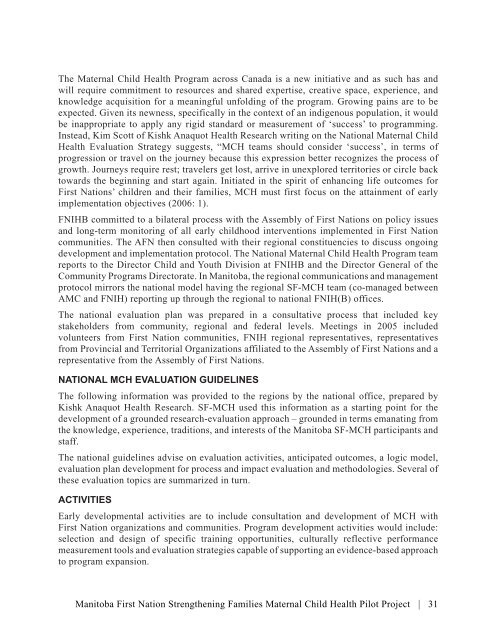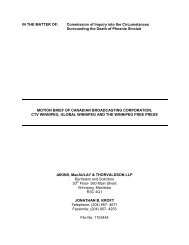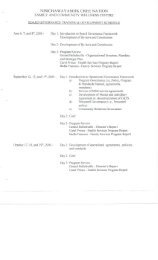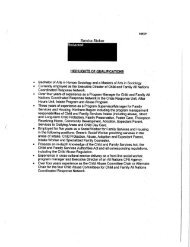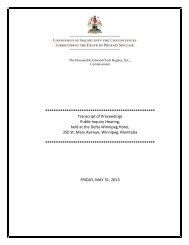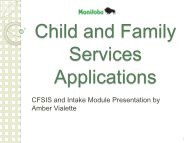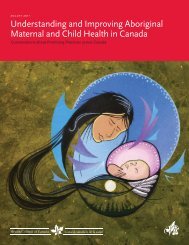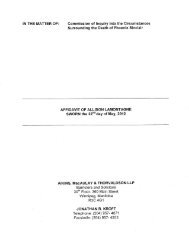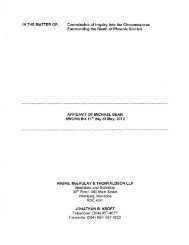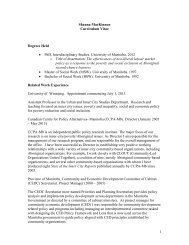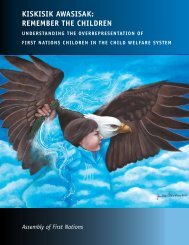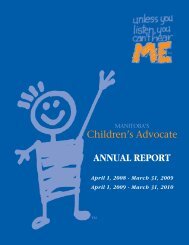Untitled - Phoenix Sinclair Inquiry
Untitled - Phoenix Sinclair Inquiry
Untitled - Phoenix Sinclair Inquiry
You also want an ePaper? Increase the reach of your titles
YUMPU automatically turns print PDFs into web optimized ePapers that Google loves.
The Maternal Child Health Program across Canada is a new initiative and as such has and<br />
will require commitment to resources and shared expertise, creative space, experience, and<br />
knowledge acquisition for a meaningful unfolding of the program. Growing pains are to be<br />
expected. Given its newness, specifically in the context of an indigenous population, it would<br />
be inappropriate to apply any rigid standard or measurement of ‘success’ to programming.<br />
Instead, Kim Scott of Kishk Anaquot Health Research writing on the National Maternal Child<br />
Health Evaluation Strategy suggests, “MCH teams should consider ‘success’, in terms of<br />
progression or travel on the journey because this expression better recognizes the process of<br />
growth. Journeys require rest; travelers get lost, arrive in unexplored territories or circle back<br />
towards the beginning and start again. Initiated in the spirit of enhancing life outcomes for<br />
First Nations’ children and their families, MCH must first focus on the attainment of early<br />
implementation objectives (2006: 1).<br />
FNIHB committed to a bilateral process with the Assembly of First Nations on policy issues<br />
and long-term monitoring of all early childhood interventions implemented in First Nation<br />
communities. The AFN then consulted with their regional constituencies to discuss ongoing<br />
development and implementation protocol. The National Maternal Child Health Program team<br />
reports to the Director Child and Youth Division at FNIHB and the Director General of the<br />
Community Programs Directorate. In Manitoba, the regional communications and management<br />
protocol mirrors the national model having the regional SF-MCH team (co-managed between<br />
AMC and FNIH) reporting up through the regional to national FNIH(B) offices.<br />
The national evaluation plan was prepared in a consultative process that included key<br />
stakeholders from community, regional and federal levels. Meetings in 2005 included<br />
volunteers from First Nation communities, FNIH regional representatives, representatives<br />
from Provincial and Territorial Organizations affiliated to the Assembly of First Nations and a<br />
representative from the Assembly of First Nations.<br />
NATIONAL MCH EVALUATION GUIDELINES<br />
The following information was provided to the regions by the national office, prepared by<br />
Kishk Anaquot Health Research. SF-MCH used this information as a starting point for the<br />
development of a grounded research-evaluation approach – grounded in terms emanating from<br />
the knowledge, experience, traditions, and interests of the Manitoba SF-MCH participants and<br />
staff.<br />
The national guidelines advise on evaluation activities, anticipated outcomes, a logic model,<br />
evaluation plan development for process and impact evaluation and methodologies. Several of<br />
these evaluation topics are summarized in turn.<br />
ACTIVITIES<br />
Early developmental activities are to include consultation and development of MCH with<br />
First Nation organizations and communities. Program development activities would include:<br />
selection and design of specific training opportunities, culturally reflective performance<br />
measurement tools and evaluation strategies capable of supporting an evidence-based approach<br />
to program expansion.<br />
Manitoba First Nation Strengthening Families Maternal Child Health Pilot Project | 31


